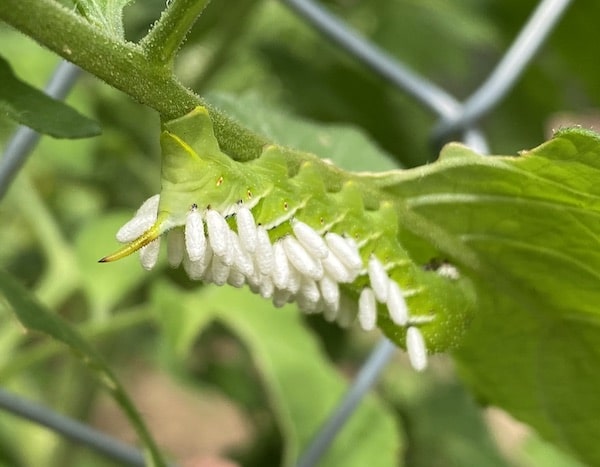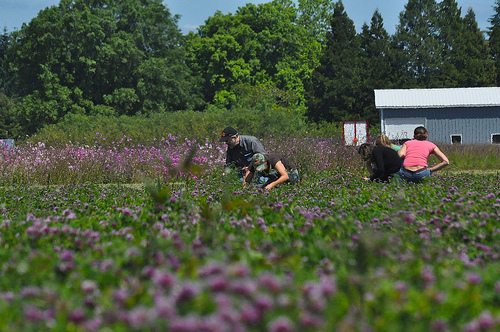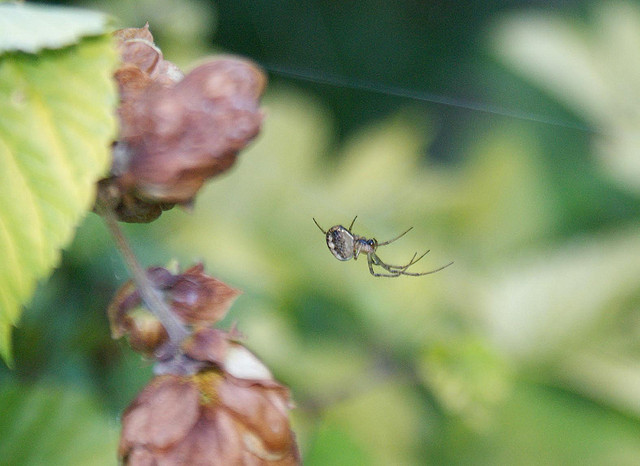Updated: August 17, 2020
Farmscaping addresses the fact that pest control is a constant problem for any vegetable gardener. This is especially true for those of us making a commitment to organic gardening. Commercial pesticides are dangerous to health and pollute the environment.
So-called “organic” pesticides OFTEN aren’t very safe either. Even the safest pesticides can kill across the board, slaughtering beneficial insects as well as pests.
The more natural approach is to fight bugs with bugs. What do I mean? Use predators and parasites to control unwanted bug populations while encouraging pollinators to visit your garden.
Attracting beneficial bugs requires a little planning, and a willingness to sacrifice a small portion of your vegetable garden to insect-attracting plants.
Related: How to Stop Squash Vine Borer

Let’s take a sec to get the legal words out of the way. This article may contain affiliate links. That means if you click and buy from my partners, I will make a tiny amount of money at no cost to you. This in no way affects my recommendations.
Farmscaping
“Farmscaping” is a play on the words “farming” and “landscaping”. It’s the practice of combining food crops with flowering plants to attract pollinating insects and predators that feed on pollen when a kill isn’t available.
The more pollinators you have buzzing around your vegetable garden, the higher your vegetable yields. This is because you almost always need pollinated flowers to get fruit or vegetables.
Oddly enough, even when fruit and vegetable plants are self pollinating, you sometimes get higher yields when pollination takes place between too different varieties of fruit or vegetable. At least that’s the theory. It would be tough to prove.
Lacewing larvae are such voracious aphid eaters they’ve earned the nickname aphid wolves.
— Suburban Hobby Farmer
As a rule, set aside five to 10 percent of your vegetable garden for flowering plants. Choose your flowering plants carefully. You want enough variety for a full season’s worth of blooms.
In addition to attracting pollinators, farmscaping adds some visual appeal to your vegetable garden. You spend plenty of time tending your garden. You might as well do it in a place of beauty.

Predatory bugs
A number of predatory bugs feast on the insect pests looking to dine on your vegetable crop. Ladybugs are a common example, but don’t neglect other critters.
Lacewing larvae, for instance, are such voracious aphid eaters they’ve earned the nickname aphid wolves.
Predatory bugs need a food source, places to shelter, and access to water. The pests you’re trying to control provide the food source, so no worries there.
Related: Controlling Mosquitoes Naturally Around a Pond
Places to shelter include tree crevices and leaf litter (ladybugs overwinter in such locations).
Ground beetles eat a wide range of soft-bodied pests, including caterpillars, slugs and garden snails. Beetles prefer undisturbed areas so they don’t have to travel far to find food and shelter. Providing some mulch for your raised beds attracts them to your garden.
Regular plant watering should provide your insect allies with enough water, or you could add a water feature to your garden.
Standing water, however, attracts its own pests, so you might want to consider combining a water feature with yard mosquito control.
Spiders
It shouldn’t need saying, but spiders are a welcome sight in a vegetable garden. These aggressive little hunters have hunted plant-harming insects for millions of years.
Staked beans, cucumbers and other climbing plants make good anchors for spider webs.
Release or Attract?
Some people deliberately release beneficial insects into their gardens, ladybugs, lacewings and other beneficial bugs from commercial outlets.
Releasing bugs can help control pests, but only if your garden is already attractive to bug-life.
Unless conditions are ideal, your bugs will either die or migrate to more attractive locations.
Related posts you might enjoy:
- Wildflowers for Beneficial Insects
- Do You Really Need to Buy Beneficial Insects
- Learning from Polyface Farm
Suburban Hobby Farmer is a participant in the Amazon Services LLC Associates Program, an affiliate advertising program designed to provide a means for sites to earn advertising fees by advertising and linking to amazon.com.
